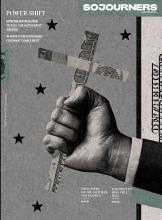A DELIGHTFUL DISCOVERY I made while researching a countercultural Christian community in Washington, D.C., was the book Gifts of Grace by Mary R. Schramm. In 1965, Mary and her husband, John, started the Community of Christ. The community intentionally wove together a deepening faith, activism for peace and justice, and shared life with other Christians from the raw starting material of honoring each person’s unique contribution. Discerning each one’s gifts was a way of learning about God’s will for their lives, individually and collectively. “I don’t care whether you’re 8 or 80,” Schramm wrote, “you are responsible for finding out the things that God would have you do.” To do that, she encouraged paying attention to what one enjoys. “I don’t think God gave you a gift or an ability to make you miserable,” Schramm said in a talk about her book. “God made us to be fulfilled by the gifts that God gave us.”
The idea of “being called” by God can be intimidating. It can also be misused — for example, when someone is convinced that they should determine what your calling is or is not, or when someone erects barriers to exclude the callings of others. An intimation of God’s call can also spur feelings of self-doubt or unworthiness, as it did initially for the prophets Isaiah and Jeremiah. Yet, in their stories we see a God who chooses individuals and calls them amid their struggles. What might be perceived as a weakness can be turned into a strength through the gift of God’s grace. Imagine! A God who wants us just as we are.
Read the Full Article

